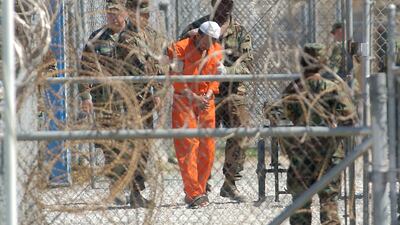US President Joe Biden remained dogmatic throughout the US withdrawal from Afghanistan. "I am president of the United States and the buck stops with me", he said in an address as the world watched 20 years of military and diplomatic work unravel.
In his determination to end the war in Afghanistan, he must realise the need for sensitivity and control. If the buck stops with him, then two months on, with the Taliban in firm control of Afghanistan and without living up to the promises they had initially made, there is a great deal of reputation his administration has to salvage on the world stage.
It will be hard, but he has avenues. One symbol of the “war on terror” that absolutely should go – and the moral case to do so will be much stronger than Afghanistan – is Guantanamo Bay, a US detention facility on an American naval base in southeastern Cuba.

Closing it would be the right thing to do for any US president, but it has proven difficult. Former US president Barack Obama promised and failed. But for Mr Biden, who says that his administration will be "rights-led", doing so is a matter of legitimacy, because since its beginning, Guantanamo has represented an offshore abuse of legal norms and human rights.
The prison is back in the news because the US has just heard the first public account of torture after the September 11 attacks by a detainee. In his testimony, Pakistani citizen Majid Khan told a jury that he was assaulted, beaten and waterboarded – another form of torture – by CIA interrogators. Seven senior US military officers have signed a letter appealing for clemency for Mr Khan. They say the torture he was allegedly subjected to is a "stain" on the US.
Unfortunately, the nature and formation of Guantanamo meant that there were many cases like Mr Khan's. The facility was set up in the wake of 9/11, a moment of huge, understandable national and international anger. This anger quickly led to actions that ran roughshod over legal norms. Guantanamo's offshore and militarised location was chosen precisely to avoid normal scrutiny. And a preference for heavy handed, sometimes torturous methods made it impossible to build legal cases and prosecute fairly.
Mr Khan's case deserved subtlety in a setting where none was possible. He pled guilty to the serious crime of aiding Al Qaeda plots in 2002. But at the time, Khan says he was naive and vulnerable to extremist ideology after the death of his mother. Crucially, he admits his crimes, expresses remorse for victims and rejects terrorism.
Closing the facility will have its challenges; Guantanamo has been a central feature of the US's response to terrorism for 20 years. But it is a policy response that only offers a flawed, short-term solution, in return for lumping the US with a reputation of breaking the law and abusing human rights. That is why it must close.
The events in Afghanistan, triggered by the US withdrawal, have shaken the world. But it must not cause a loss of confidence for the Biden administration on its correct path to learning from the failures of the war on terror. Guantanamo does not have to continue to pose such a problem. Instead, it can be a much-needed sign that the US is learning from errors and atoning in a well-thought out and fair manner.


